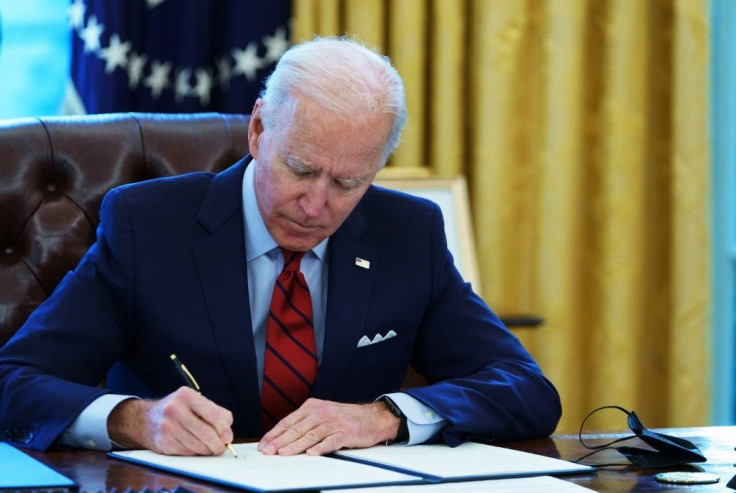
A historic agreement between the U.S. and South Korea has been reached in response to the nuclear threat posed by North Korea.
Washington has consented to send U.S. nuclear-armed submarines to South Korea and regularly includes Seoul in nuclear planning activities.
South Korea has committed to avoiding creating nuclear weapons in exchange.
U.S. President Joe Biden said the Washington Declaration will improve the allies' cooperation in preventing a North Korean assault.
Concern over North Korea's nuclear danger has grown on both sides of the conflict.
Pyongyang is perfecting its long-range weapons to reach the U.S. mainland and creating tactical nuclear weapons that can hit South Korea.
The U.S. has already agreed to defend South Korea under international law, and it has also promised to deploy nuclear weapons if necessary.
However, some South Koreans have begun to question that dedication and advocate for the nation to continue its nuclear development.
The Washington Declaration, according to South Korean President Yoon Suk-yeol, who was in Washington on a state visit, represented an "unprecedented" commitment by the U.S. to strengthen the defense, fend off threats, and defend its allies by using nuclear weapons.
A senior administration official claims that the new deal is the outcome of discussions that lasted for several months, BBC reported.
With the new agreement, the U.S. will send a nuclear-armed submarine to South Korea for the first time in 40 years, along with other strategic assets like bombers that can deliver nuclear weapons.
A Nuclear Consultative Group will also be formed by the two parties to talk about nuclear planning-related concerns.
Seoul's politicians have long urged Washington to include them more in the process of deciding how and when to deploy nuclear weapons against North Korea.
South Koreans are fearful of being kept in the dark about what would cause Biden to detonate a nuclear weapon on their behalf as North Korea's nuclear arsenal has expanded in size and capability.
A fear that Washington may stop the events in Seoul has prompted demands that South Korea produce its own nuclear weapons.
But in January, Yoon shocked Washington leaders when he became the first South Korean president in decades to bring up this concept again.
The U.S. quickly realized that encouraging words and actions would no longer be effective and that in order to stop South Korea from wishing to make its own bombs, it would have to make an actual offer.
Furthermore, Yoon stated that he anticipated making "tangible" progress before returning home.
Duyeon Kim, from the Centre for a New American Security, said it was a "big win" for South Korea to be involved in nuclear planning.
"Until now, tabletop exercises would end before Washington's decision to use nuclear weapons," said Kim.
"The U.S. had considered such information to be too classified to share, but it is important to practice and train for this scenario given the types of nuclear weapons North Korea is producing."
The South Korean government has been calling for more involvement, and this new Nuclear Consultative Group checks the box. But the more important query is whether it will allay public concerns.
It does not represent a complete U.S. commitment to using nuclear weapons to defend South Korea from an attack by North Korea.
On the other hand, Biden stated on Wednesday, "A nuclear attack by North Korea against the United States or its allies and partners is unacceptable and will result in the end of whatever regime were to take such an action."
As payment, the U.S. has required that South Korea continue to be a nuclear-free zone and a staunch opponent of the spread of nuclear weapons.
The U.S. believes that stopping South Korea from developing nuclear weapons is crucial because it worries that if it fails, other nations may do the same.
However, it is unclear whether these U.S. assurances will completely appease the important and increasingly vocal group of professors, scientists, and members of the ruling party in South Korea who have been advocating for Seoul to arm itself.
Dr. Cheong Seong-chang, a leading proponent of South Korea going nuclear, said that while the declaration had many positive aspects, it was "extremely regrettable that South Korea had openly given up its right to withdraw from the Nuclear Non-Proliferation Treaty [NPT]", adding that this had "further strengthened our nuclear shackles".
Biden stated that the U.S. was making ongoing efforts to re-engage North Korea in negotiations. Washington claims that Pyongyang has rejected multiple requests for unconditional talks.
Although Kim Jong Un, the leader of North Korea, declared the country's nuclear status to be "irreversible" last year, the U.S. still hopes to persuade North Korea to give up its nuclear weapons.
Some experts claim that discussing weapons control rather than denuclearization now makes more sense.
© 2025 Latin Times. All rights reserved. Do not reproduce without permission.




